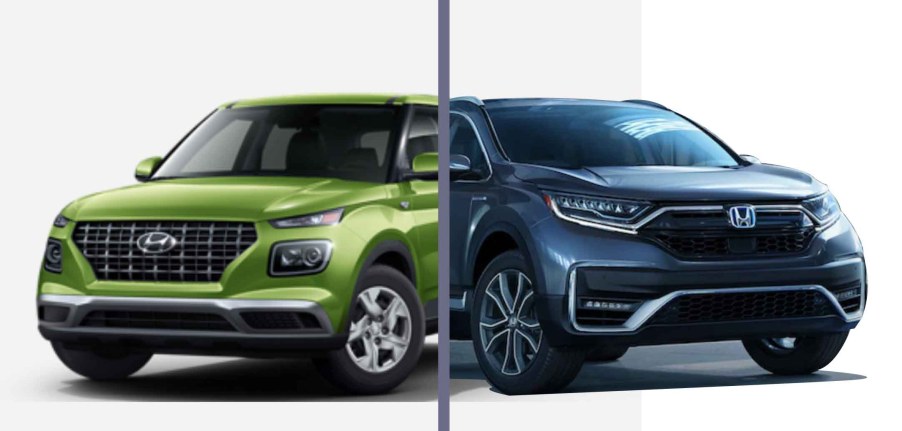
Honda vs Hyundai: What Are The Biggest Differences?
It’s more than a rhetorical question. Besides both having an “H” at the beginning of their names they are vastly different companies. Both represent quality and have their following but both have completely different backstories and got to where they are in very different ways.
Honda’s start in America
Honda started in Japan after WWII and was mostly a motorcycle company. By the 1960s it was importing its motorcycles and establishing a strong reputation for light, fun motorcycles that were inexpensive and easy to work on. Combined with its hugely successful “You Meet the Nicest People On A Honda” 1960s advertising campaign it was a recognized builder of quality bikes.

That helped it once it began importing cars. Its initial offerings were too small for American tastes but once it introduced the Civic in the early 1970s it hit gold. Combined with the CVCC engine system or Compound Vortex Controlled Combustion it was recognized as an engineering marvel that produced plenty of power while polluting less. When the slightly larger Accord was introduced in 1976 Honda dealers in the US could not keep them in stock.
Hyundai’s beginnings in America

For Hyundai, the South Korean’s start was also difficult at first. Imported into the US in 1986 the Excel did not exhibit the style, power, or quality the Japanese were known for. But its list price just under $5,000 caught many US customers looking for a cheap new car. It sold over 160,000 that first year.
As quality improved it advertised 100,000-mile factory warranties, which was unheard of. That convinced customers to trust Hyundai if it was willing to put that much service behind it. Over the years Hyundai has always put a little more into each of its cars and SUVs than customers expect for the price. The Japanese also had that philosophy in the early days helping it win over US customers.
How Honda’s and Hyundai’s reputations compare

While Honda still has a reputation as an engineering company that also builds quality vehicles, Hyundai has a different reputation. It has been exceeding the competition when it comes to features, style, and quality of interiors and tech. Honda has been a bit behind in offering hybrid versions of its cars and has been slow to capitalize on being one of the early electric vehicle producers. It began manufacturing the EV Plus in 1997.
Meanwhile, Honda introduced a higher-level or premium brand with Acura in 1986. But the Acura line has had a hard time defining itself in the crowded segment. Hyundai has only recently followed suit with the Genesis premium line. The 2021 Genesis GV80 three-row SUV which came out in 2020 has catapulted over the competition in every aspect from price to quality and features. It got everyone’s attention looking for a new SUV.

Both Honda and Hyundai have different models for almost every segment
Honda has established some of the best-selling segments including small SUVs with its CR-V selling almost 400,000 in 2019. The stalwart Accord sells close to 300,000 a year and is a perennial favorite. The larger pilot sold over 135,000 last year.

For Hyundai, it is slowly trying to conquer every segment one-by-one. The midsize Elantra sedan has established itself as a force in that segment. The Sonata full-size sedan compares to other luxury sedans in this class; some of which have been doing this for decades. And the mid-size Palisade SUV gets top marks from reviewers.
There was a time when recommending a Hyundai product was a compromised proposition, but today it leads in many segments across the board. As for Honda, it has been resting on its longstanding reputation for engineering and quality. Recently it has come out of its comfort zone to begin offering segment-leading models. Acura in particular, seems to be showing new life after years of products that never stood out.
When it comes to warranties one company offers more
As for warranties, most Honda buyers know its quality reputation so it is not as much of a factor. But in nearly every case Hyundai still leads with a 100,000-mile powertrain warranty, twice the Limited Vehicle warranty of 5-years or 60,000 miles, and 5-year unlimited roadside assistance and lifetime hybrid battery warranty that Honda does not.

So, most Honda buyers are not swayed by Hyundai’s better warranties. But as Hyundai is a lesser-known manufacturer it stakes its reputation one leading with extended warranties that beat the competition.
To be sure you need to compare in person and make sure you’re comparing similar features
The best suggestion when comparing the two companies as a whole is to look at reviews, study the forums to see what’s really happening with vehicles in the field, and then compare both before you buy. Each company sells a slightly different product based on a different price point. Base models won’t impress as much as loaded vehicles so compare apples to apples between the two companies when you can.
Once you have narrowed your sights then test drive your choice to make sure the feel, handling, road-noise, performance, and features suit your tastes and your budget.



